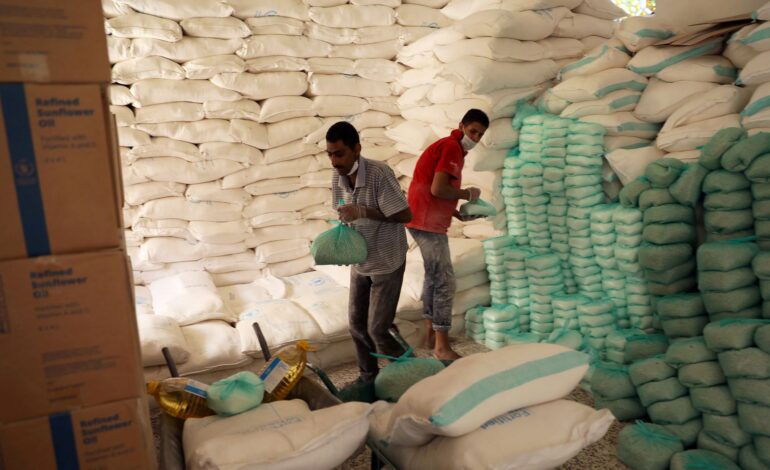YEMEN — On Thursday, the U.S. called on the international community, especially regional countries, to fulfill their pledges to increase funding for humanitarian assistance to Yemen and warned that aid programs could otherwise be forced to close.
U.S. Special Envoy to Yemen Timothy Lenderking told a webinar sponsored by the National Council on U.S.-Arab Relations that humanitarian programs for Yemen will begin to close unless contributions increase in the next few months.
Six years of war have killed tens of thousands of Yemenis, mostly civilians, and left millions on the brink of famine. Around 80 percent of Yemen’s population, or 24 million people, rely on humanitarian relief to survive.
In April 2020, the World Food Program halved food aid to deliveries every other month in parts of Yemen controlled by the Houthi movement after donors cut funding, partly over concerns about obstruction of aid.
More funds have started flowing since U.N. officials said in April that Yemen could suffer the world’s worst famine in decades as violence escalated amid the COVID-19 pandemic.
Sarah Charles, a senior official with the U.S. Agency for International Development, echoed Lenderking’s warning.
“We commend the generous pledges made by other generous donors so far this year,” she said, noting that the U.S. will provide more funds on top of $350 million allocated this year. “The fact is that more funding is required to address growing needs.”
Six years of war have killed tens of thousands of Yemenis, mostly civilians, and left millions on the brink of famine. Around 80 percent of Yemen’s population, or 24 million people, rely on humanitarian relief to survive
Humanitarian crisis
David Gressly, a U.N. official resident in Yemen, said governments have yet to fulfill pledges made earlier this year totaling $2.1 billion to help address the dire humanitarian crisis caused by the Yemen war.
He also said humanitarian organizations are having problems reaching some 6 million Yemenis.
Gressly said as many as 300 migrants may have died after a ship capsized recently off Yemen’s coast, highlighting the risks of a longstanding migration route from the Horn of Africa to the rich Gulf states in search of work.
Gressly did not give details, but he appeared to be referring to an incident when a number of bodies washed up at Ras al-Arah on Yemen’s Red Sea coast earlier this month after a migrant boat sank offshore.
The migrant crisis is adding more pressure on the already dire humanitarian situation in Yemen, he added.
Lenderking expressed hope for a ceasefire between the Saudi-led coalition and the Iran-aligned Houthis to alleviate the crisis.
“My experience from the Houthis is that they have spoken about a commitment towards peace in Yemen…. We continue to engage with them,” Lenderking said. “The United States recognizes them as a legitimate actor, we recognize them as a group that has made significant gains. No one can wish for them (to be) away or out of the conflict, so let’s deal with realities that exist on the ground.”
— Reuters report, edited for style






Leave a Reply